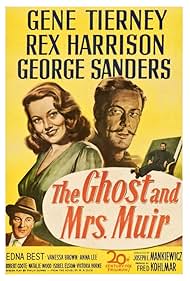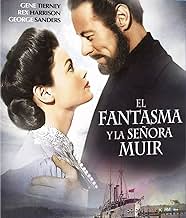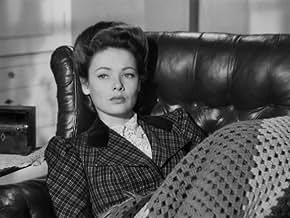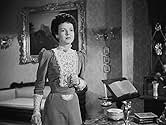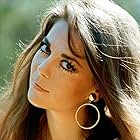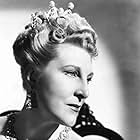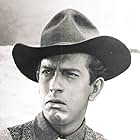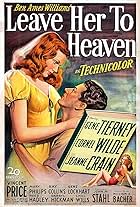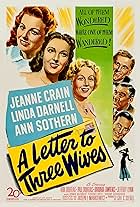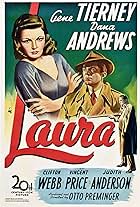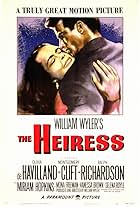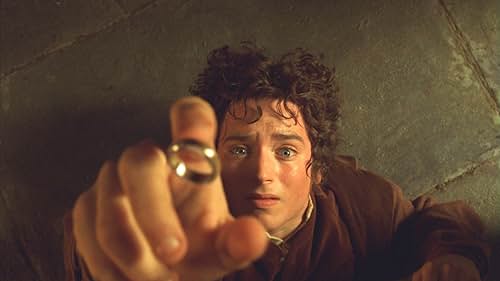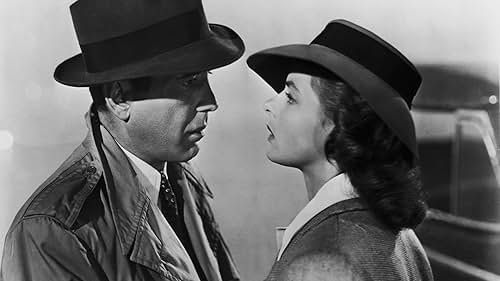ÉVALUATION IMDb
7,8/10
22 k
MA NOTE
En 1900, une jeune veuve découvre que son chalet en bord de mer est hanté et forme une relation unique avec le fantôme.En 1900, une jeune veuve découvre que son chalet en bord de mer est hanté et forme une relation unique avec le fantôme.En 1900, une jeune veuve découvre que son chalet en bord de mer est hanté et forme une relation unique avec le fantôme.
- Réalisation
- Scénaristes
- Vedettes
- Nommé pour 1 oscar
- 1 victoire et 1 nomination au total
Helen Freeman
- Author Displaced by Lucy
- (uncredited)
Whitford Kane
- Sproule - London Publisher
- (uncredited)
Buster Slaven
- Enquiries at Sproule's
- (uncredited)
Will Stanton
- Porter
- (uncredited)
William Stelling
- Bill - Anna's Fiance
- (uncredited)
Houseley Stevenson
- Gardener
- (uncredited)
David Thursby
- Mr. Scroggins
- (uncredited)
7,822.2K
1
2
3
4
5
6
7
8
9
10
Avis en vedette
Great performances in an excellent fantasy film
The Ghost and Mrs Muir reunited the Dragonwyck lead actress Gene Tierney, and its director Joseph L. Mankiewicz for an even better film. The Ghost and Mrs Muir, while a little pretentious at times, stands out as one of the finest romance films of Hollywood's golden period, and an interesting and entertaining fantasy film to boot. Over four decades before Demi Moore fell in love with a ghost in the sentimental, sappy trash flick 'Ghost'; Gene Tierney was doing it in far better style with this film. As you might expect from a film that features a woman falling in love with a spirit; there's more than a few plot holes on display. However, the film has this great ability to make the audience believe in it - and that is mostly down to the fabulous performances from all concerned. The plot follows a widow who moves into a house by the sea in order to escape her meddling in-laws. She knows that the house is haunted before she moves in, but the idea of living in a haunted house fascinates her; and she's fascinated further when she finds herself falling in love with the ghost of the previous owner.
It has to be said that, with the characters, what you see is pretty much what you get. Gene Tierney, whom I'm becoming a bigger fan of every time I see one of her movies, is the headstrong widow - while Rex Harrison is the cantankerous seaman. The characters mostly bathe in their own traits, but this helps the film immensely as it means that it's their relationship that always takes centre stage, and that is the biggest draw of the film. The film is very romantic, but it never gets dull or sappy. The ending brilliantly shows the film in its best light, as it's as heart-warming and tragic as the film deserves. Aside from romance, there's a strong comedy element in the film - and the best is often made of that, most notably in the hilarious sequence that sees the in-laws visit our heroine's new house. One thing I love about old films is the way that they show how different things are nowadays - this is best shown here by the fact that, in one scene, Rex Harrison is told off for swearing; after saying 'blast'. Overall, this is an excellent and criminally under seen movie that comes with high recommendations!
It has to be said that, with the characters, what you see is pretty much what you get. Gene Tierney, whom I'm becoming a bigger fan of every time I see one of her movies, is the headstrong widow - while Rex Harrison is the cantankerous seaman. The characters mostly bathe in their own traits, but this helps the film immensely as it means that it's their relationship that always takes centre stage, and that is the biggest draw of the film. The film is very romantic, but it never gets dull or sappy. The ending brilliantly shows the film in its best light, as it's as heart-warming and tragic as the film deserves. Aside from romance, there's a strong comedy element in the film - and the best is often made of that, most notably in the hilarious sequence that sees the in-laws visit our heroine's new house. One thing I love about old films is the way that they show how different things are nowadays - this is best shown here by the fact that, in one scene, Rex Harrison is told off for swearing; after saying 'blast'. Overall, this is an excellent and criminally under seen movie that comes with high recommendations!
Simply great, a movie that can bring a man to tears....
I saw this movie for the first time when I was sixteen, now almost thirty years have passed and I still cry every time I think about the film. . My favorite image is the deteriorating pier with her daughters name carved into it...what a beautiful and sad way to convey the passing of time.I recently watched it again and the lump in my throat has not passed as of yet.So sad, So beautiful!
Enchanting, Comical, as well as haunting love story.
Lucy Muir, a widow of one year, decides to start life anew, with daughter and faithful housekeeper, in a cottage by the sea, despite the warnings by the real estate salesman that the house is haunted by the ghost of its former owner, a seaman, Capt. Gregg. After Mrs. Muir encounters the ghost, the two strike an eerie, yet deep relationship, which grows even more when Lucy, forced to earn the money for payment of the cottage, writes a book about the captain's sea encounters. When Lucy sells the manuscript, she meets and falls for a fellow writer, a relationship, which does not sit well with the housekeeper, the daughter, and especially the captain. Will Capt. Gregg have to roam again to find eternal happiness? A beautiful film from all standpoints, with brilliant performances by Tierney and Harrison, who play extremely well off each other with tender, humorous, and bickering encounters, and Sanders, who is as usual, his charming self. A touching and romantic ending set this film off as one of the all time great cinematic love stories. Rating, 9 of 10.
A childhood favorite that withstood the test of time
I first saw this movie when I was very young - maybe 9 or so - when my mother rented it. I remember watching it over and over again. When I saw that the DVD had come out I didn't even hesitate; I bought it right away. I'm glad I did.
There are many themes that find their way into this movie: feminism, romance, the supernatural, etc. The one that struck me the most was a longing for something that could never be while maintaining the practical to survive. There is a constant tension between Gene Tierney (Mrs. Muir) and Rex Harrison (Captain Gregg) that is never really satisfied. Words of love are never spoken, not even in the passionate monologue from Rex Harrison. But they are unnecessary because the undercurrents are so strong. Through this tension they work and live normally because what else is there to do? Because of this there is a layer of sad acceptance in the actions of Mrs. Muir and Captain Gregg, which is understandable to all of the audience - this is an emotion that all people are forced to feel at one point or another.
From a technical standpoint, the film is obviously in black and white which does nothing to detract from the story. The cinematography was nominated for an Oscar, and should have won in my opinion. I also am one of many that want to rebuild the house and live there forever. The passage of time should definitely be noted, as it was masterfully portrayed.
On the whole, it is a wonderful movie which I would recommend to anyone.
There are many themes that find their way into this movie: feminism, romance, the supernatural, etc. The one that struck me the most was a longing for something that could never be while maintaining the practical to survive. There is a constant tension between Gene Tierney (Mrs. Muir) and Rex Harrison (Captain Gregg) that is never really satisfied. Words of love are never spoken, not even in the passionate monologue from Rex Harrison. But they are unnecessary because the undercurrents are so strong. Through this tension they work and live normally because what else is there to do? Because of this there is a layer of sad acceptance in the actions of Mrs. Muir and Captain Gregg, which is understandable to all of the audience - this is an emotion that all people are forced to feel at one point or another.
From a technical standpoint, the film is obviously in black and white which does nothing to detract from the story. The cinematography was nominated for an Oscar, and should have won in my opinion. I also am one of many that want to rebuild the house and live there forever. The passage of time should definitely be noted, as it was masterfully portrayed.
On the whole, it is a wonderful movie which I would recommend to anyone.
"In my opinion, you are the most obstinate young woman I have ever met."
Delightful is the best word I can think of to describe The Ghost and Mrs. Muir. It's got everything - drama, comedy, romance, fantasy, good acting, solid direction, interesting cinematography, a beautiful score, atmosphere, nice sets, and a well-written script. It's taken me a while to finally get around to watching The Ghost and Mrs. Muir. From what some friends of mine (whose opinions I am now highly suspicious of) warned me that it was a sappy, sentimental movie and not my kind of thing at all. They couldn't have been more wrong. In short, it's very nearly a prefect movie.
While I could write pages about most every aspect of this film, I'll instead just mention a couple of areas that really stood out to me. First, the acting. Over the past couple of years I've become something of a Gene Tierney fan. I've still got a way to go see all of her films, but I sincerely doubt I'll enjoy her performance in anything as much as I did The Ghost and Mrs. Muir (and that includes Laura). I can't imagine anyone doing a better job of bringing life to Lucy Muir. It was easy to forget I was watching a character on a screen and not peeping into the life of a real person. Well done.
The second area I'll mention is the score. Bernard Herrmann's music fits every frame of The Ghost and Mrs. Muir flawlessly. The music adds immensely to the emotional roller coaster that is the plot. There are very few scores I would rate any higher than this one.
While I could write pages about most every aspect of this film, I'll instead just mention a couple of areas that really stood out to me. First, the acting. Over the past couple of years I've become something of a Gene Tierney fan. I've still got a way to go see all of her films, but I sincerely doubt I'll enjoy her performance in anything as much as I did The Ghost and Mrs. Muir (and that includes Laura). I can't imagine anyone doing a better job of bringing life to Lucy Muir. It was easy to forget I was watching a character on a screen and not peeping into the life of a real person. Well done.
The second area I'll mention is the score. Bernard Herrmann's music fits every frame of The Ghost and Mrs. Muir flawlessly. The music adds immensely to the emotional roller coaster that is the plot. There are very few scores I would rate any higher than this one.
Le saviez-vous
- AnecdotesBernard Herrmann considered his musical score for this movie to have been his best.
- GaffesThe movie opens at the turn of the century when Anna is about 6-8 years old. About 10 or so years later, when she comes home from college, everyone is dressed as if it were the 1940s.
- Citations
Captain Daniel Gregg: You must make your own life amongst the living and, whether you meet fair winds or foul, find your own way to harbor in the end.
- Générique farfeluOpening credits prologue: LONDON at the turn of the century.
- ConnexionsEdited into Spisok korabley (2008)
Meilleurs choix
Connectez-vous pour évaluer et surveiller les recommandations personnalisées
Détails
- Date de sortie
- Pays d’origine
- Langue
- Aussi connu sous le nom de
- The Ghost and Mrs. Muir
- Lieux de tournage
- Stillwater Cove Regional Park, Pebble Beach, Californie, États-Unis(Stillwater Cove, Pebble Beach, California)
- société de production
- Consultez plus de crédits d'entreprise sur IMDbPro
Box-office
- Brut – à l'échelle mondiale
- 29 545 $ US
- Durée
- 1h 44m(104 min)
- Couleur
- Rapport de forme
- 1.37 : 1
Contribuer à cette page
Suggérer une modification ou ajouter du contenu manquant
